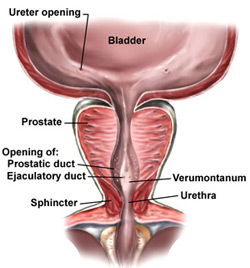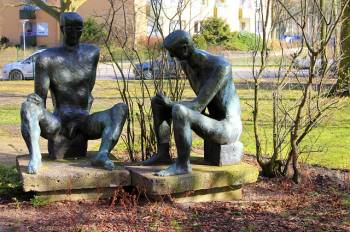Prostate Diseases
 The prostate gland sits just beneath the bladder, and surrounds the urethra (part of the urinary tract) as it leaves the bladder. The prostate gland is responsible for producing part of semen, which is released at the climax of the sexual act.
The prostate gland sits just beneath the bladder, and surrounds the urethra (part of the urinary tract) as it leaves the bladder. The prostate gland is responsible for producing part of semen, which is released at the climax of the sexual act.
What causes Symptoms?
As a man gets older, his prostate usually becomes enlarged. This typically occurs in men after the age of 50. As the prostate gland enlarges, it causes compression of the urethra which passes through it. This obstruction results in the slowing down of the flow of urine.
The onset of these obstructive symptoms are usually very gradual,and may not be noticable at first. Some men may notice that their urine stream does not travel as far as it did when they were younger, or they have to wait just a little bit longer before their urine starts flowing. As the urine stream tails off at the end, there may be some dribbling which often proves to be rather troublesome.
Typical Obstructive Symptoms are as follows:
(caused by the enlarged prostate obstructing the bladder outlet)
• Hesitancy: having to wait a while before urine starts flowing
• Poor Stream: the urine flows with less force
• Terminal Dribbling: the urine stream tails off at the end, resulting in dribbles
• Incomplete Emptying: the sensation that there is still some urine remaining in the bladder after urination.
Prostatic enlargement may also cause the so-called, "irritative symptoms". These symptoms occur as a result of the bladder having to consistently work harder in order to overcome the obstruction caused by the enlarged prostate. Eventually, this affects the way the bladder behaves.
Typical Irritative Symptoms are as follows:
(caused by the bladder having to work harder to overcome the obstruction)
• Frequency: the need to pass urine frequently
• Urgency: being unable to hold on after feeling the need to pass urine. This can sometimes lead to incontinence.
• Nocturia: having to wake up at night to pass urine
• Sensation of Incomplete Emptying: there may be the sensation of incomplete evacuation of urine even though the bladder may be empty.
Complications of an Enlarged Prostate
As the prostate gland gets progressively enlarged causing progressively more obstruction, the following complications may result:
 1. Acute retention of urine (ARU):
1. Acute retention of urine (ARU):
When this happens, the man will suddenly be unable to pass urine. As the bladder gets progressively filled up with more urine, the pressure within the bladder can cause quite a lot of distress and pain. When the prostate gland is enlarged and is causing some degree of obstruction to urinary flow, certain conditions can tip the balance to result in ARU.
For example:
• Constipation: stools in the intestines can cause added pressure to the already obstructed urethra
• After surgery
• Being confined to bed for whatever reason
• If urine is held in the bladder for too long: Holding on to urine for too long (such as during travelling) sometimes leads to ARU
• Drugs: diuretics, codeine containing drugs (such as certain cough syrups) etc
2. Chronic retention of urine:
In chronic retention, the bladder may gradually fill up to be many times its normal size, over a period of months or years. As this is generally painless, men are generally unaware of this happening, until the overfull bladder starts to leak urine. This condition is referred to as "overflow incontinence". Chronic increased back pressure can eventually damage the kidneys.
3. Urinary tract infections:
Disruption of normal urine flow makes infections of the urinary tract more likely.
4. Stone formation:
Disruption of normal urine flow and stasis provide the correct environment for crystalization and formation of stones.
Causes of Prostate Enlargement
The vast majority of prostatic enlargement is benign, although cancerous enlargements do occur in a small number.
1. Benign Prostatic Hypertrophy (BPH)
In BPH, the prostate gland slowly enlarges over time, and as its name suggests, this abnornmal growth is benign. The exact cause of this enlargement is uncertain, but it does involve the male hormones, and does not occur in men castrated at an early age.
2. Prostate Cancer
Cancer of the prostate is one of the most common cancers in Singaporean males. It most commonly affects the outer layer of the gland, but as it grows and spreads to the central parts of the gland, it can also cause obstructive symptoms, similar to that of BPH.
Many men with prostate cancer first occuring in the outer parts of the gland, may also have BPH affecting the inner part of the gland. It is BPH which may first produce symptoms, prompting a visit to the doctors.
3. Prostatitis
Prostatitis refers to inflammation of the prostate gland. This typically occurs as a result of an infection, and may cause symptoms which can be rather vague and difficult to diagnose.
Other non-prostate conditions which may cause "prostatic symptoms"
There are some other conditions which do not involve the prostate, but can cause symptoms which mimic a prostate pathology.
These would include the following:
• bladder stones
• urethral strictures
• bladder tumours
Investigating the Prostate
Prostate problems are often picked up as part of a routine examination. Doctors usually screen elderly males for symptoms which would suggest a problem with the prostate gland. Occasionally, patients see their doctor when there are bothersome symptoms related to the gland as we have discussed above.
Before you see your doctor, it would be a good idea to think carefully about your symptoms to assess their severity and how they are affecting you. Some men who may have symptoms, simply want the reassurance that the condition is not something life-threatening, and are otherwise happy to live with it. Others are significantly troubled by their symptoms and are desperate for treatment.
The Physical Examination:
Other than a general examination, to ascertain your general state of health, your doctor will examine your abdomen to feel if your bladder is enlarged (a sign of retention of urine).
The final part of the examination will be a digital rectal examination, in which you will be asked to lie to your side and bend at the knees. This will make your prostate easier to feel. Your doctor will then insert a gloved finger into your rectum in order to assess the size and other characteristics of your prostate. Normally, the prostate gland is not tender, but in prostatitis, tenderness may be felt. Occasionally, during the examination, your doctor may massage your prostate in order to obtain a specimen of fluid from it for laboratory testing.
Investigations:
• Blood test: to assess kidney function. PSA (prostate-specific antigen) levels are often tested.
• Urine flow measurement: an enlarged prostate may cause obstruction of normal urine flow. Devices are able to test this flow to ascertain if there is an obstruction, and to determine its severity. This test is very simply done. You will basically be made to pass urine into a funnel-shaped container, and all the measurements are obtained automatically.
• Measurement of Residual Urine: a device placed over the lower abdomen allows doctors to determine the volume of urine retained in the bladder after passing urine.
• Imaging: x-rays and ultrasound examinations may be done to assess for ureteric or kidney stones, or hydronephrosis (swelling of kidney).
• Transrectal ultrasound: a transrectal ultrasound scan is done by passing a small probe into the rectum. This allows for visualization of the prostate gland. If necessary, a sample of prostate tissue may biopsied for testing.
The article above is meant to provide general information and does not replace a doctor's consultation.
Please see your doctor for professional advice.
